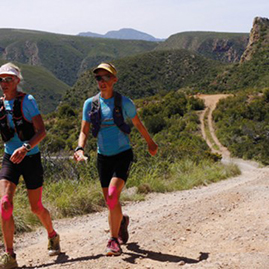
Mimi Anderson is not your average 51-year-old grandmother. In fact, she’s not your average ultra-runner either. Mimi has completed challenges beyond what your average ultra-runner would even contemplate taking part in. She has run in the most extreme environments, including the Jungles of Peru, ran a gruelling 840 miles from John O’Groats to Lands End to set a new female world record, and this year has run 2000K across South Africa’s Freedom Trail to support Save the Children in establishing a Social Enterprise Business. This year Mimi was the only finisher in the Cyprus Ultra – a race she undertook in preparation for the Freedom Trail.
Mimi began running at the age of 36. Starting off with a couple of 10Ks and half marathons in 1999, Mimi took to ultras two years later. She now trains five or six times per week with a recovery week every fourth week. “Building up to South Africa I did ten back-to-back days of 20K runs on different terrain as well as a few longer runs of over 14 hours. I also try to fit in cross-training and core work at the gym,” she says. Mimi tells us that she does as much preparation as she can, including mental. ‘The mental side of racing is very important. I imagine what it’s going to feel like when my body is in extreme pain, then try and find ways that will help me deal with the scenario when it happens.”
Able to run 64 marathons back-to-back, Mimi is obviously doing something right. If you fancy an ultra, here are Mimi’s tops tips:
■ Choose a race that suits your strengths and the terrain you enjoy running on; this will help keep you motivated during training.
■ Ensure that your training fits into your busy life, build up the distances gradually to enable your body to get used to them and, if short on time, split the long run up, doing half in the morning and half in the evening. Incorporate speed work and fast walking into your training.
■ Listen to your body. It will tell you when things aren’t right, if you’re pushing yourself too hard and not sleeping properly. If you ignore these signs it could mean more time off training.
■ Prepare yourself mentally by not thinking about the whole distance. Break it down into smaller more manageable chunks, take one segment at a time, throw it away and move on.
■ Practice your nutrition and hydration strategies for race day; everyone is different so what works for others may not work for you. Eat little and often.






